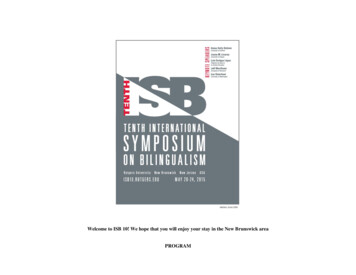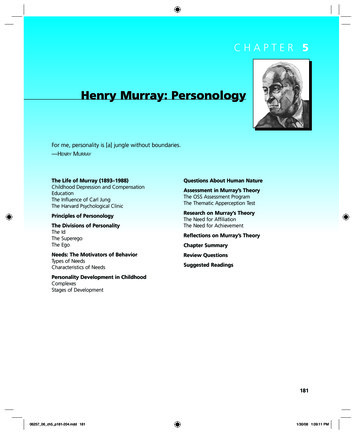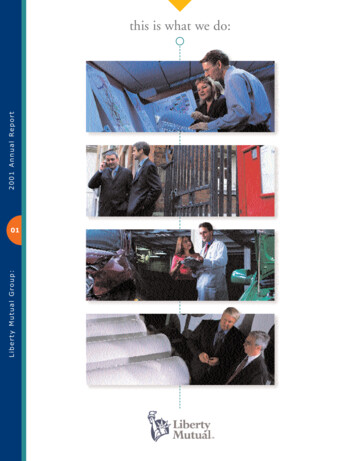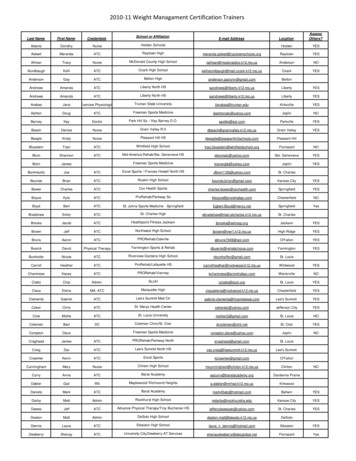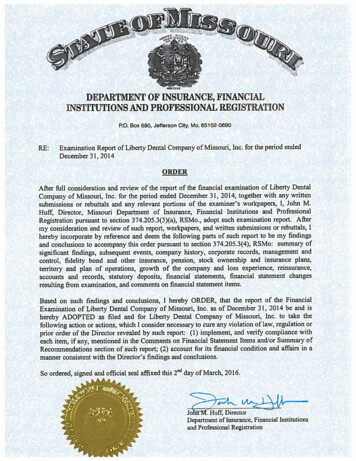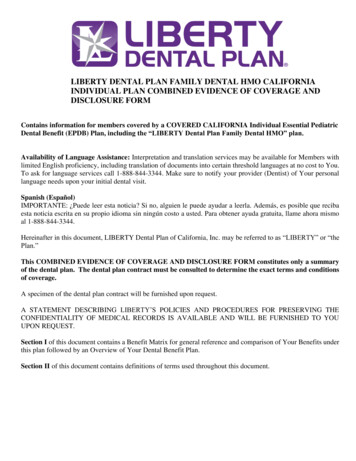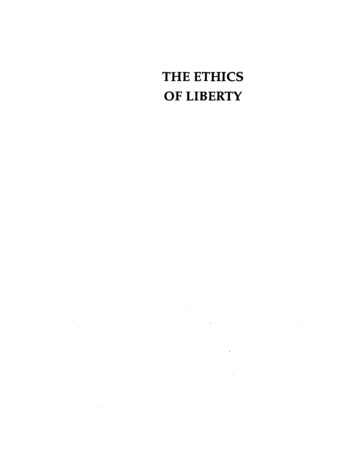
Transcription
THE ETHICSOF LIBERTY
THE ETHICSOF LIBERTYMurray N. Rothbardwith a new introductionby Hans-Hermann HoppeNEW YORK UNIVERSITY PRESSNew York and London
The Center for Libertarian Studies and the Ludwig von Mises Institute thank all oftheir donors for making possible the republication of this classic of liberty, and in particularthe following Patrons: Athena Tech, John H. Bolstad, William T. Brown, Willard Fischer,Douglas E. French, Frank W. Heernstra, Franklin Lee Johnson, Richard J. Kossmann, M.D.,William W. Massey, Jr., Sam Medrano, Joseph Edward Paul Melville, Mason P. Pearsall,Conrad Schneiker, Eward Schoppe, Jr., Mr. and Mrs. Thomas W. Singleton, Mary LouStiebling, Loronzo H. Thomson, the L.H. Thomson Co., and Mr. and Mrs. Donald F.Warmbier.For editorial assistance, thanks to Mark Brandly, Williamson Evers, Tony Flood,Jomie Gilrnan, Scott Kjar, Judy Thommesen, and Jeffrey Tucker.NEW YORK UNIVERSITY PRESSNew York and London01998 by New York UniversityAll rights reservedLibrary of Congress Cataloging-in-Publication DataRothbard, Murray Newton, 1926-1995The ethics of liberty / Murray N. Rothbard.p. cm.Originally published: Atlantic Highlands, N.J. : Humanities Press,1982. With new introd.) and index.Includes bibliographical references (p.ISBN 0-8147-7506-3 (alk. paper)1. Liberty. 2. Natural law. 3. Ethics. I. Title.JC585.R69 1998323.44'01--ddl98-10058CIPNew York University Press books are printed on acid-free paper,and their binding materials are chosen for strength and durability.Manufactured in the United States of America
TOTHE MEMORY OFF R A N K CHODOROVEA. "BALDY" HARPERand my fatherDAVID ROTHBARD
CONTENTSPARTI: INTRODUCTION:NATURALLAW1. Natural Law and Reason .32. Natural Law as "Science" . 93.Natural Law versus Positive Law . 174.Natural Law and Natural Rights . 215. The Task of Political Philosophy .25PART11: A THEORYOF LIBERTY6. A Crusoe Social Philosophy . 297.Interpersonal Relations: Voluntary Exchange . 358.Interpersonal Relations: Ownership and Aggression .459. Property and Criminality . 5110.The Problem of Land Theft . 6311. Land Monopoly, Past and Present . 6912.Self-Defense .7713.Punishment and Proportionality . 8514.Children and Rights . 9715. "Human Rights" As Property Rights . 11316.Knowledge, True and False . 12117. Bribery . 12918. The Boycott . 13119.Property Rights and the Theory of Contracts . 13320. Lifeboat Situations . 14921.The "Rights" of Animals . 155PART111: THE STATEVERSUSLIBERTY22.The Nature of the State . 16123. The Inner Contradictions of the State . 17524.The Moral Status of Relations to the State . 18325. On Relations Between States . 189
PARTIV: MODERNALTERNATIVETHEORIESOF LIBERTY26. Utilitarian Free-Market Economics .201A. Introduction: Utilitarian Social Philosophy . 201B. The Unanimity and Compensation Principles . 203C. Ludwig von Mises and "Value-Free" Laissez Faire . 20627. Isaiah Berlin on Negative Freedom . 215.F.A. Hayek and The Concept of Coercion . 21929. Robert Nozick and the Immaculate Conception of the State . 231. 28PARTV. TOWARDA THEORYOF STRATEGYFOR LIBERTY30. Toward a Theory of Strategy for Liberty . 257viii
"As reason tells us, all are born thus naturally equal, i.e., withan equal right to their persons, so also with an equal right totheir preservation . . . and every man having a property in hisown person, the labour of his body and the work of his handsare properly his own, to which no one has right but himself; itwill therefore follow that when he removes anything out ofthe state that nature has provided and left it in, he has mixedhis labour with it, and joined something to it that is his own,and thereby makes it his property. . . . Thus every man havinga natural right to (or being proprietor of) his own person andhis own actions and labour, which we call property, it certainlyfollows, that no man can have a right to the person or propertyof another: And if every man has a right to his person andproperty; he has also a right to defend them . . . and so has aright of punishing all insults upon his person and property."Rev. Elisha Williams(1744)
INTRODUCTIONbyHans-Herrnann HoppeIn an age of intellectual hyperspecialization, Murray N. Rothbard wasa grand system builder. An economist by profession, Rothbard wasthe creator of a system of social and political philosophy based oneconomics and ethics as its cornerstones. For centuries, economics andethics (politicalphilosophy) had diverged from their common origin intoseemingly unrelated intellectual enterprises. Economics was a value-free"positive" science, and ethics (if it was a science at all)was a "normative" science.As a result of this separation, the concept of property had increasinglydisappeared from both disciplines. For economists, property soundedtoo normative, and for political philosophers property smacked of mundane economics. Rothbard's unique contribution is the rediscovery ofproperty and property rights as the common foundation of both economicsand political philosophy, and the systematic reconstruction and conceptual integration of modern, marginalist economics and natural-law political philosophy into a unified moral science: libertarianism.Following his revered teacher and mentor, Ludwig von Mises, Misesfsteachers Eugen von Bohm-Bawerk and Carl Menger, and an intellectualtradition reaching back to the Spanish late-Scholastics and beyond, Rothbardian economics sets out from a simple and undeniable fact and experience (a single indisputable axiom):that man acts, i.e., that humans alwaysand invariably pursue their most highly valued ends (goals) with scarcemeans (goods). Combined with a few empirical assumptions (such asthat labor implies disutility), all of economic theory can be deduced fromthis incontestablestarting point, thereby elevating its propositions to thestatus of apodictic, exact, or a priori true empirical laws and establishingeconomics as a logic of action (praxeology).Rothbard modeled his first magnumopus, Man, Economy, and State1on Mises's monumental Human Actiom2Init, Rothbard developed the entire body of economic theory-from utilitytheory and the law of marginal utility to monetary theory and the theoryof the business cycle-along praxeological lines, subjecting all variants ofquantitative-empirical and mathematical economics to critique and logical(Princeton,N.J.: D. Van Nospand, 1962).2. Ludwig von Mises, Human Action (New Haven, Conn.: Yale University Press, 1949).1.Murray N. Rothbard, Man, Economy and State
xiiTHE ETHICS OF LIBERTYrefutation, and repairing the few remaining inconsistencies in the Misesian system (such as his theory of monopoly prices and of government andgovernmental security production). Rothbard was the first to present thecomplete case for a pure-market economy or private-property anarchism asalways and necessarily optimizing social utility. In the sequel, Power andMarket: Rothbard further developed a typology and analyzed the economic effects of every conceivable form of government interference in markets.In the meantime, Man, Economy, and State (including Power and Market asits third volume) has become a modern classic and ranks with Mises's HumanAction as one of the towering achievements of the Austrian School of economics.Ethics, or more specifically political philosophy, is the second pillarof the Rothbardian system, strictly separated from economics, but equallygrounded in the acting nature of man and complementing it to form aunified systern of rationalist social philosophy. The Ethics of Liberty,originally published in 1982, is Rothbard's second magnum opus. In it, heexplains the integration of economics and ethics via the joint concept ofproperty; and based on the concept of property, and in conjunction witha few general empirical (biologicaland physical) observations or assumptions, Rothbard deduces the corpus of libertarian law, from the law of appropriation to that of contracts and punishment.Even in the finest works of economics, including Mises's HumanAction, the concept of property had attracted little attention before Rothbard burst onto the intellectual scene with Man, Economy, and State. Yet,as Rothbard pointed out, such common economic terms as direct and indirect exchange, markets and market prices, as well as aggression, invasion, crime, and fraud, cannot be defined or understood without a priortheory of property. Nor is it possible to establish the familiar economictheorems relating to these phenomena without an implied notion of property and property rights. A definition and theory of property must precedethe definition and establishment of all other economic terms and theorem . At the time when Rothbard had restored the concept of property toits central position within economics, other economists-most notablyRonald Coase, Harold Demsetz, and Armen Alchian-also began to redirectprofessional attention to the subject of property and property rights.However, the response and the lessons drawn from the simultaneous3. Murray N. Rothbard, Power and Market, 2nd ed. (Kansas City: Sheed Andrews andMcMeel, 1977).4. See Rothbard, Man, Economy, and State, ch. 2, esp. pp. 78-80.
INTRODUCTIONxiiirediscovery of the centrality of the idea of property by Rothbard on theone hand, and Coase, Demsetz, and Alchian on the other, were categoricallydifferent.The latter, as well as other members of the influential Chicago Schoolof law and economics, were generally uninterested and unfamiliar withphilosophy in general and political philosophy in particular. Theyunswervingly accepted the reigning positivistic dogma that no such thingas rational ethics is possible. Ethics was not and could not be a science,and economics was and could be a science only if and insofar as it was"positive" economics. Accordingly the rediscovery of the indispensablerole of the idea of property for economic analysis could mean only thatthe term property had to be stripped of all normative connotationsattached to it in everyday "non-scientific" discourse. As long as scarcityand hence potential interpersonal conflict exists, every society requires awell-defined set of property rights assignments. But no absoluteuniversally and eternally-correct and proper or false and improper wayof defining or designing a set of property rights exists; and there existsno such thing as absolute rights or absolute crimes, but only alternativesystems of property rights assignments describing different activities asright and wrong. Lacking any absolute ethical standards, the choicebetween alternative systems of property rights assignments will bemade-and in cases of interpersonal conflicts should be made bygovernmentjudges-based on utilitarian considerations and calculations;that is, property rights will be so assigned or reassigned that the monetaryvalue of the output produced is thereby maximized, and in all cases ofconflicting claims government judges should so assign them.Profoundly interested in and familiar with philosophy and the history of ideas, Rothbard recognized this response from the outset as justanother variant of age-old self-contradictory ethical relativism. For in claiming ethical questions to be outside the realm of science and then predictingthat property rights will be assigned in accordance with utilitarian costbenefit considerations or should be so assigned by government judges,one is likewise proposing an ethic. It is the ethic of statism, in one or bothof two forms: either it amounts to a defense of the status quo, whateverit is, on the grounds that lastingly existing rules, norms, laws, institutions,etc., must be efficient as otherwise they would already have been abandoned;or it amounts to the proposal that conflicts be resolved and propertyrights be assigned by state judges according to such utilitarian calculations.Rothbard did not dispute the fact that property rights are and historically have been assigned in various ways, of course, or that the different
xivTHE ETHICS OF LIBERTYways in which they are assigned and reassigned have distinctly differenteconomic consequences. In fact, his Power and Market is probably the mostcomprehensive economic analysis of alternative property rights arrangements to be found. Nor did he dispute the possibility or importanceof monetary calculation and of evaluating alternative property rightsarrangements in terms of money. Indeed, as an outspoken critic of socialism and as a monetary theorist, how could he? What Rothbard objectedto was the argumentativelyunsubstantiated acceptance, on the part of Coaseand the Chicago law-and-economics tradition, of the positivistic dogmaconcerning the impossibility of a rational ethic (and by implication, theirstatism) and their unwillingness to even consider the possibility that theconcept of property might in fact be an ineradicably normative conceptwhich could provide the conceptual basis for a systematic reintegrationof value-free economics and normative ethics.There was little to be found in modern, contemporary political philosophy that Rothbard could lean on in support of such a contention. Owingto the dominance of the positivistic creed, ethics and political philosophyhad long disappeared as a "science" or else degenerated into an analysisof the semantics of normative concepts and discourse.And when politicalphilosophy finally made a comeback in the early 1970s, in the wake of JohnRawls and his Theory of ftrsticef5the recognition of scarcity as a fundamentalhuman condition and of private property and private property rights asa device for coordinating the actions of individuals constrained by scarcitywas conspicuously absent. Neither "property" nor "scarcity" appeared inRawls's elaborate index, for instance, while "equality" had several dozenentries.In fact, Rawls, to whom the philosophy profession has in the meantime accorded the rank of the premier ethicist of our age, was the primeexample of someone completely uninterested in what a human ethic mustaccomplish: that is, to answer the question of what I am permitted to doright now and here, given that I cannot not act as long as I am alive andawake and the means or goods which I must employ in order to do soare always scarce, such that there may be interpersonal conflicts regardingtheir use. Instead of answering this question, Rawls addressed analtogether different one: what rules would be agreed upon as "just" or"fair" by "parties situated behind a veil of ignorance"? Obviously, the answer to this question depends crucially on the description of the "originalposition" of "parties behind a veil of ignorance." How, then, was this situation defined? According to Rawls, behind the veil of ignorance "no5.John Rawls, A Theoy of ,rustice (Cambridge, Mass.: Harvard University Press, 1971).
INTRODUCTIONone knows his place in society, his class position or social status; nordoes he know his fortune in the distribution of natural assets and abilities,his intelligence and strength, and the like. . . . It is taken for granted,however, that they know the general facts about human society. Theyunderstand political affairs and the principles of economic theory; theyknow the basis of social organization and the laws of human psy hology." While one would think that scarcity ranks among the general factsof society and economic theory, Rawls's parties, who supposedly knewabout scarcity, were themselves strangely unaffected by this condition. InRawls's construction of the "original position," there was no recognitionof the fact that scarcity must be assumed to exist even here. Even in deliberating behind a veil of ignorance, one must still make use of scarce meansat least one's physical body and its standing room, i.e., labor and land.Even before beginning any ethical deliberation then, in order to makethem possible, private or exclusive property in bodies and a principle regarding the private or exclusive appropriation of standing room must alreadybe presupposed. In distinct contrast to this general fact of human nature,Rawls's moral "parties" were unconstrained by scarcities of any kind andhence did not qualify as actual humans but as free-floating wraiths ordisembodied somnambulists. Such beings, Rawls concluded, cannot but"acknowledge as the first principle of justice one requiring an equal distribution (of allresources). Indeed, this principle is so obvious that we wouldexpect it to occur to anyone immediatelym7True; for if it is assumed that"moral parties" are not human actors but disembodied entities, the notionof private property must indeed appear strange. As Rawls admitted withcaptivating frankness, he had simply "define(d1 the original position so thatwe get the desired resukn8Rawls's imaginary parties had no resemblancewhatsoever with human beings but were epistemological somnambulists;accordingly, his socialist-egalitarian theory of justice does not qualify asa human ethic, but something else entirely.If anything useful could be found in Rawls in particular and contemporary political philosophy in general, it was only the continued recognitionof the age-old universalization principle contained in the so-called GoldenRule as well as in the Kantian Categorical Imperative: that all rules aspiringto the rank of just rules must be general rules, applicable and valid foreveryone without exception.6. Ibid. p. 137.7. Ibid, pp. 150-51.8. Ibid, p. 141.
xviTHE ETHICS OF LIBERTYRothbard sought and found support for his contention regardingthe possibility of a rational ethic and the reintegration of ethics and economics based on the notion of private property in the works of the lateScholastics and, in their footsteps, such "modern" natural-rights theoristsas Grotius, Pufendorf, and Locke. Building upon their work, in The Efhicsof Liberty Rothbard gives the following answer to the question of what Iam justified doing here and now: every person owns his own physicalbody as well as all nature-given goods which he puts to use with thehelp of his body before anyone else does; this ownership implies his rightto employ these resources as one sees fit so long as one does not therebyuninvitedly change the physical integrity of another's property or delimitanother's control over it without his consent. In particular, once a goodhas been first appropriated or homesteaded by "mixing one's labor" withit (Locke's phase), then ownership of it can only be acquired by meansof a voluntary (contractual)transfer of its property title from a previousto a later owner. These rights are absolute. Any infringement on them issubject to lawful prosecution by the victim of this infringement or hisagent, and is actionable in accordance with the principles of strict liabilityand the proportionality of punishment.Taking his cues from the very same sources, Rothbard then offeredthis ultimate proof for these rules as just rules: if a person A were not theowner of his physical body and all goods originally appropriated,produced or voluntarily acquired by him, there would only exist twoalternatives. Either another person, B, must then be regarded as the ownerof A and the goods appropriated, produced, or contractually acquiredby A, or both parties, A and B, must be regarded as equal co-owners ofboth bodies and goods.In the first case, A would be B's slave and subject to exploitation. Bwould own A and the goods originally appropriated, produced, oracquired by A, but A would not own B and the goods homesteaded,produced, or acquired by B. With this rule, two distinct classes of peoplewould be created--exploiters (B) and exploited (A)-to whom different"law" would apply. Hence, this rule fails the "universalization test" andis from the outset disqualified as even a potential human ethic, for inorder to be able to claim a rule to be a "law" (just), it is necessary thatsuch a rule be universally-equally-validfor everyone.In the second case of universal co-ownership, the requirement ofequal rights for everyone is obviously fulfilled. Yet this alternative suffersfrom another fatal flaw, for each activity of a person requires the employmentof scarce goods (at least his body and its standing room). Yet if all goodswere the collective property of everyone, then no one, at any time and in
INTRODUCTIONxviiany place, could ever do anything with anything unless he had everyother co-owner's prior permission to do what he wanted to do. And howcan one give such a permission if one is not even the sole owner of one'svery own body (and vocal chords)? If one were to follow the rule of totalcollective ownership, mankind would die out instantly. Whatever thisis, it is not a human e h c either.Thus, one is left with the initial principles of self-ownership andfirst-use-first-own, i.e., original appropriation, homesteading. They passthe universalization test-they hold for everyone equally-and they canat the same time assure the survival of mankind. They and only they aretherefore non-hypothetically or absolutely true ethical rules and humanrights.Rothbard did not claim that these fundamental principles of justconduct or proper action were new or his own discovery, of course.Equipped with near encyclopedic knowledge ranging over the entire fieldof the sciences of man, he knew that-at least as far as the social sciencesare concerned-there is little new under the sun. In the fields of ethicsand economics in particular, which form the cornerstones of the Rothbardian system and which are concerned with non-hypothetical truths,it must be expected that most of our knowledge consists of "old," longago discovered insights. Newly discovered non-hypothetical truths, evenif not impossible, should be expected to be rare intellectual events, andthe newer they are, the more suspect they are. It must be expected thatmost non-hypothetical truths already have been discovered and learnedlong ago and merely need to be rediscovered and relearned by everysuccessive generation. And it also should be expected that scientificprogress in ethics and economics, zis in other disciplines concerned withnon-hypothetical propositions and relations such as philosophy, logic,and mathematics, will usually be extremely slow and painstaking. Thedanger is not that a new generation of intellectuals cannot add anythingnew or better to the stock of knowledge inherited from the past, but ratherthat it will not, or only incompletely, relearn whatever knowledge alreadyexists, and will fall into old errors instead.Accordingly, Rothbard saw himself in the role of a politicalphilosopher as well as an economist essentially as a preserver anddefender of old, inherited truths, and his claim to originality-, like that ofMises, was one of utmost modesty. Like Mises, his achievement was tohold onto and restate long-ago established insights and repair a few errorswithin a fundamentally complete intellectual edifice. Yet this, as Rothbardknew well, was in fact the rarest and highest possible intellectualachievement. For, as Mises once remarked about economics which holds
THE ETHICS OF LIBERTYxviiiequally true for ethics, "there never lived at the same time more than ascore of men whose work contributed anything essential to economic ." Rothbard was one of those rare individuals who did contribute to ethicsas well as economics.This is illustrated in The Ethics of Liberty. All elements and principlesevery concept, analytical tool, and logical procedure-of Rothbard'sprivate-property ethic are admittedly old and familiar. Even primitivesand children intuitively understand the moral validity of the principleof self-ownership and original appropriation.And indeed, the list of Rothbard's acknowledged intellectual predecessors goes back to antiquity. Yet,it is difficult to find anyone who has stated a theory with greater ease andclarity than Rothbard. More importantly, due to the sharpened methodological awareness derived from his intimate familiarity with the praxeological, axiomatic-deductive method, Rothbard was able to provide morerigorous proof of the moral intuitions of self-ownership and original appropriation as ultimate ethical principles or "axioms," and develop a more systematic, comprehensive, and consistent ethical doctrine or law code thananyone before him. Hence, The Ethics of Liberty represents a close realizationof the age-old desideratum of rationalist philosophy of providing mankindwith an ethic which, as Hugo Grotius demanded more than 300 yearsago, "even the will of an omnipotent being cannot change or abrogate" andwhich "would maintain its objective validity even if we should assumeper impossibile-that there is no God or that he does not care for humanaffairs."When The Ethics of Liberty appeared in 1982, it initially attractedonly a little attention in academia. Two factors were responsible for thisneglect. First, there were the anarchistic implications of Rothbard's theory,and his argument that the institution of government-the state-isincompatible with the fundamental principles of justice. As defined byRothbard, a state is an organizationwhich possesses either or both (in actual fact, almost alwaysboth) of the following characteristics: (a) it acquires its revenueby physical coercion (taxation);and (b)it achieves a compulsorymonopoly of force and of ultimate decision-makingpower overa given territorial area. Both of these essential activities of theState necessarily constitute criminal aggression and depredationof the just rights of private property of its subjects (includingself-ownership). For the first constitutes and establishes theft9. Mises, Human Action, p. 873.
INTRODUCTIONxixon a grand scale; while the second prohibits the free competitionof defense and decision-making agencies within a giventerritorial area-prohibiting the voluntary purchase and saleof defense and judicial services (p. 172-73)."Without justice," Rothbard concluded as St. Augustine had before him, "thestate was nothing but a band of robbers."Rothbard's anarchism was not the sort of anarchism that his teacherand mentor Mises had rejected as hopelessly naive, of course. "The anarchists," Mises had written,contend that a social order in which nobody enjoys privilegesat the expense of his fellow-citizens could exist without anycompulsion and coercion for the prevention of action detrimental to society. . . . The anarchists overlook the undeniable factthat some people are either too narrow-minded or too weak to adjust themselves spontaneously to the conditions of social life. . . .An anarchisticsociety would be exposed to the mercy of everyindividual. Society cannot exist if the majority is not ready tohinder, by the application or threat of violent action, minoritiesfrom destroying the social order.1 Indeed, Rothbard wholeheartedly agreed with Mises that withoutresort to compulsion, the existence of society would be endangered andthat behind the rules of conduct whose observance is necessary to assurepeaceful human cooperation must stand the threat to force if the wholeedifice of society is not to be continually at the mercy of any one of itsmembers. One must be in a position to compel a person who will notrespect the lives, health, personal freedom, or private property of othersto acquiesce in the rules of life in society.llInspired in particular by the nineteenth-centuryAmerican anarchistpolitical theorists Lysander Spooner and Benjamin Tucker and the Belgianeconomist Gustave de Molinari, from the outset Rothbard's anarchismtook it for granted that there will always be murderers, thieves, thugs,con artists, etc., and that life in society would be impossible if they werenot punished by physical force. As a reflection of this fundamentalrealism-anti-utopianism-ofhis private-property anarchism, Rothbard,unlike most contemporary political philosophers, accorded centralimportance to the subject of punishment. For him, private property andthe right to physical defense were inseparable. No one can be said to be10. Ibid., p. 149.11. Ludwig von Mises, Liberalism (Kansas City: Sheed Andrews and McMeel, 1978) p. 37.
THE ETHICS OF LIBERTYthe owner of something if he is not permitted to defend his property byphysical violence against possible invaders and invasions. "Would," Rothbard asked, "somebody be allowed to 'take the law into his own hands'?Would the victim, or a friend of the victim, be allowed to exact justice personally on the criminal?" and he answered, "of course, Yes, since all rights ofpunishment derive from the victim's right of
The ethics of liberty / Murray N. Rothbard. p. cm. Originally published: Atlantic Highlands, N.J. : Humanities Press, 1982. With new introd. . JC585.R69 1998 323.44'01--ddl 98-10058 CIP New York University Press books are printed on acid-free paper, and their binding materials are chosen for strength and durability. Manufactured in the United .
